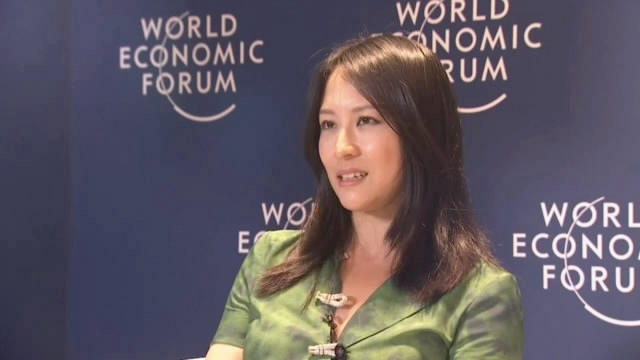

In the context that sweeping technological changes are propelling the Fourth Industrial Revolution, data information has become critical as an input to technology and production, and people should realize that "technology being shared" could also bring various economic benefits to all, according to Jin Keyu, professor of Economics at the London School of Economics.
In terms of whether there is a newer scope for collaboration among countries, she said that information technology is "non-rivalrous," different from oil, labor or capital.
"We're talking about a potential new avenue for connectivity and collaboration and more for scale," Jin opined, adding "cooperation is crucial among countries, because technology being shared could also bring a lot of economic benefits to all."

Jin Keyu, professor of Economics at the London School of Economics. /CGTN Photo
Jin believes that pushing for a more cooperative and collaborative global agenda is in China's interest, and she expects China to play a leading role in the area, "especially when it comes to forging connectivity across the emerging markets network."
Global economy 2019
Given the fluctuations happening around the world, Jin sees a weaker economic performance in 2019 than last year.
She partly attributed losing economic performance and weak market sentiment to trade tensions, cautioning that the global economy is "due for a recession."
"It's been 10 years. It's around the corner," she noted, warning that "what the countries are arguing over and doing is not helping to relieve that tension, but actually accelerating the possibility of recession coming in."
Based on her observations, long-term interest rates in Western countries are quite low currently and interest rates in the next decade are expected to be low as well. Both indicate that "there's a persistent lack of demand in that part of the world."
"Now the interesting question is who can provide that demand that will anchor the global economy," she said, regarding emerging markets, like China, as demand providers.
She further explained that the trade tension is not helping to "leverage off China's ability" to meet the global demand. In the meantime, due to the decrease of trade surplus in China and the slowdown of domestic economic growth, there is less room to cushion the slump of the global demand.
"The trade tension overall is not helping to leverage off China's ability to supply that demand. There was a period where China demanding more from the rest of the world could be a positive stimulus for the world. But now because it's heading to zero and given China's own economic situation, there's less room to cushion that," she told CGTN.
As the emerging economies are rising and accounting for a large share of the world GDP, Jin said China is pushing for a new global outlook that incorporates voices and interests of the emerging markets.
She highlighted the Belt and Road Initiative (BRI), saying that the initiative not only offers physical connectivity, but also profits digital connectivity.
"We have seen China actively filling the gap for the emerging markets, where that gap needs to be filled, because the IMF and the U.S. Fed have not always come to become a really solid liquidity provider in times of urgency like Argentina, and this is where PBOC has stepped in and provide liquidity," Jin said.

Copyright © 2018 CGTN. Beijing ICP prepared NO.16065310-3
Copyright © 2018 CGTN. Beijing ICP prepared NO.16065310-3